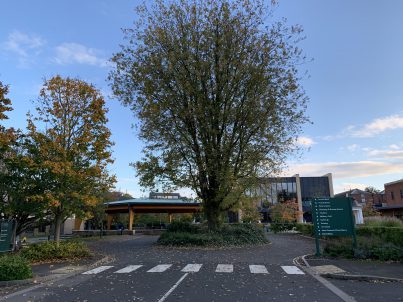
December 19, 2019, by Simon Langley-Evans
Experiences of being a student with a disability in the School of Biosciences
We are currently well into ‘Disability December’ and current Biosciences students Beth Titchiner and Heather Carpenter have shared their experiences of studying in the School of Biosciences:
Tell us a bit about yourselves
Beth: I am studying Microbiology, and I have been here for a year and a half.
Heather: I am also studying Microbiology – this is my first year.
What has been your experience as a disabled student at the University of Nottingham generally?
Beth: My overall experience has been very positive. One of the things that attracted me to the University of Nottingham was the fact that the course I wanted to study was offered part-time (very important because my disability prevents full-time study), and that the Head of School was hosting and writing an EDI blog. Knowing that the Head of School was actively supporting EDI efforts made me feel that this would be somewhere I could feel safe and welcome as a disabled person.
My first term was very challenging – moving to a new city with a disability takes a lot of work, because it means leaving your support networks behind and building new ones. Registering with and getting to know new doctors, occupational therapists etc. is often not straightforward, and consumed a lot of time and energy. This detracted from my studies somewhat during my first year and was stressful at times, but now that I am more settled and have the appropriate support in place, I am finding that I am better able to focus on my course.
My personal tutor has been extremely supportive from the start, and often went out of their way during my first term to check that I was alright and able to navigate around campus ok. This was something I really appreciated. Another thing that made a huge difference was the university’s accessible minibus. Paul the minibus driver does a wonderful job of making sure I get to my lectures and home again safely, and I doubt I would have lasted long without his support.
Heather: In general, the disability support has been very good – the disability team were proactive in arranging a meeting with me before the start of term to assess my needs and put a support plan in place. The flexibility of the support plan is also a bonus enabling you to update your needs as new and unforeseen challenges present themselves.
The part-time application process was a bit tricky – with the forms not really geared up to part-time or UK students and the interface not particularly intuitive, but Student Services were extremely helpful and understanding in this regard.
Are there any particular issues you have encountered at Sutton Bonington?
Beth: Most of the buildings at Sutton Bonington are wheelchair accessible, as many are quite new. However, I do encounter issues with accessibility in some of the older buildings. Main Building and the library are quite old, and are not easy to access with a wheelchair due to thick carpeting and lack of accessible toilets. The lecture theatres in Main Building were not designed with wheelchair users in mind. However, my tutors have been accommodating by making sure that I am not timetabled for classes in the Main Building, and the library staff are happy to fetch books for me if needed.
When it rains, a number of the dropped kerbs on campus flood. At first this stopped me getting to lectures sometimes, but I have since learnt which routes to use in wet weather. There are some nice new eco buildings on campus which are pretty good for wheelchair access, but they can be cold in the winter as they don’t have heating. My condition affects my temperature regulation, so I do find it hard to stay warm on Sutton Bonington campus.
Heather: I, like Beth, have temperature regulation issues and have found all the buildings to be a bit too cold for me. My ASD and joint issues have also meant that the library isn’t really a place I can work; it is rather noisy the lighting is poor and the furniture isn’t really pain friendly.
What do we do well in supporting students with a disability?
Beth: Many staff members have made an active effort to ensure that I am able to participate in classes. One of the biggest challenges of being disabled can be other people’s attitudes, so the welcoming and accommodative attitudes of teaching staff in Biosciences is something I have greatly appreciated.
When I started my course I was unsure how practical classes would work with the physical and sensory processing difficulties that my condition causes. I was concerned about being able to physically do experiments and following verbal instructions in a busy lab. But Darren Hepworth who manages the teaching laboratory has been extremely supportive right from the start. He has helped with setting up the adjustable-height bench so I can use my wheelchair in the lab, getting out my lab coat and equipment, ensuring the demonstrators know what kind of support I might need, and buying antibacterial wipes to clean my wheelchair after handling microbes. It is extremely helpful that lecturers upload instructions for practical classes to Moodle in advance, because this allows time to familiarise myself with the instructions before going into the lab. Accessing the written instructions on a tablet in the lab also helps a lot.
Recording lectures as standard is something that the school of Biosciences does well. Being able to go back and listen to lecture recordings at home is really helpful, because the verbal processing aspect of my disability means that I often miss parts of what the lecturer has said.
Heather: Supportive staff and – as Beth mentioned – the lecture capture system have both been invaluable, particularly during periods of ill-health when I cannot physically attend.
What could we do better?
Beth: It would be great if there was more information on the Biosciences website listing the support that is available specifically for disabled Bioscience students (on top of the support offered through central disability support services). Before I came to UoN I didn’t know whether it was possible to do lab work with a physical disability, so it was a bit of a leap of faith. I tried Googling ‘disabled microbiologists’ and didn’t get many results! So I think it would be good to advertise to potential students that it is possible to study Biosciences if you have a physical disability, and to show some of the adaptations that can be made to make practical classes accessible.
It took me a while to learn wheelchair accessible routes around Sutton Bonington campus. A map of accessible routes could be really useful to new students. For students with health conditions who don’t live on Sutton Bonington campus, it can be very tiring to stay on campus all day and often rest breaks are an integral part of our occupational therapy or treatment plans. This is a specific type of break which usually involves using relaxation techniques in a quiet, undisturbed environment to reduce cortisol, pain, fatigue, sensory overload etc. It can be difficult to find somewhere to do this, so many disabled people end up using the disabled toilets for this purpose. It would be great if we had some dedicated quiet rooms for disabled staff and students to rest undisturbed (and take medications, do physiotherapy exercises, etc. which are also often essential).
Heather: Not all lectures are recorded – this often seems to be due to IT issues or a lack of staff training rather than a refusal on the part of the lecturer! However, as SFE no longer seem to be funding note-takers via DSA it would be extremely useful to try and ensure all lectures are available online (either as a recording, or even just a transcript) – this would really help people (like me) who cannot always make it in.
Again, I agree with Beth on the rest room idea – I find I end up spending a lot of time sitting in my car to get some respite. Somewhere warm and quiet to go and be alone would be brilliant – additionally microwave and kettle access would be a lifesaver to those who do not live on campus.
The following contacts may be useful for students (and staff) who have a disability:
Biosciences Disability Liaison Officer: Liz Bailey
University of Nottingham Disability Support ServicesEmail: disability-supportservices@nottingham.ac.uk
Phone: +44 (0)115 82 32070
- General Contacts for students with a disability
- University of Nottingham Disabled Students’ Network & Disabled Students’ Officer:
- Disabled Students’ Network Facebook Group
Email: sudisabledofficer@nottingham.ac.uk
How do I feedback on an issue that impacts my personal access to facilities – or those of my friends / colleagues ?
Our Equality, Diversity and Inclusion Committee are keen to hear about any issue(s) that impact on our campus. Feedback and submissions can be treated as anonymous, but will always be considered in order to address the inclusivity of all users and visitors.
In the same way, we will reflect on all the comments made in this blog and strive to improve.
No comments yet, fill out a comment to be the first


Leave a Reply